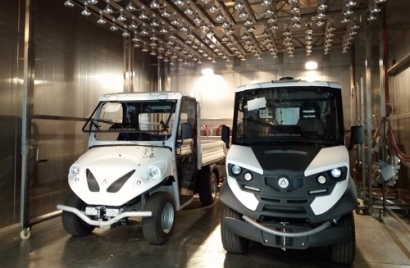
The project ended with a workshop attended by a hundred members of the electric vehicle industry in Vigo, Spain. In the workshop, the new air conditioning control system was shown, which is combined with other improvements in the cabin insulation and reduction of its weight. All this ensures the comfort of the passengers while significantly reducing the amount of energy that is usually wasted in the heating and cooling systems of electric vehicles.
“With goals of reducing the energy used for passenger comfort heating and cooling with at least 50 %, the JOSPEL project has been very ambitious. Consequently, we are extremely pleased that the goals have been achieved – and even surpassed. This means that our efforts can help make electric vehicles more energy efficient and marketable in the future,” said technical coordinator, Begoña Galindo Galiana , AIMPLAS.
At the heart of the JOSPEL project are the thermoelectric Joule and Peltier effects, which have shown significant potential in terms of reducing the amount of energy used for heating and cooling in electric vehicle cabins. A heating system based on the Joule effect creates a radiant heating in the vehicle cabin which – combined with fresh air fans for air renewal – results in an improvement of the passenger thermal comfort sensation. Thermoplastic panels and thermoset textiles were developed as heating elements, thereby reducing the energy consumption with at least 30 % compared to existing PTC heaters. Climatic chamber tests were carried out to simulate extreme climate conditions in the car, and the thermal comfort was evaluated with sensors (ISO14505-2) and real passengers (ISO14505-3). The JOSPEL heating solutions were close to perfection, as the warm body with fresh air from the fans resulted in a thermal comfort classification of neutral to slightly warm.
In addition to developing these new heating and cooling systems, JOSPEL has applied optimized thermal management to the battery and other vehicle components. Also, by adding green driving technologies, an additional energy reduction of 24% has been achieved. For its part, light technologies and improved cabin insulation with new glazing designs reduce an additional 3% of energy consumption.
"By bringing together science and industry from across Europe, JOSPEL has managed to exploit emerging research opportunities in the field of heating and cooling, insulation, and communication systems for electric vehicles. With the project coming to an end, the next step is to make the results, approaches and technologies available to SMEs and companies in the electric vehicle industry, so they can advance them further in the pursuit of a cleaner, healthier, and more sustainable society," said Itziar Carracedo Fernández, AIMPLAS, Project Manager of JOSPEL.
JOSPEL has had a total budget of €6.7 million and has received funding from the research and innovation program of the European Union Horizon 2020. It has involved industrial and research partners from Croatia, Italy, United Kingdom, Luxembourg, France, Spain, Portugal, Denmark and Germany.
Photo: The climatic chamber where tests for thermal comfort evaluation were carried out. To the left is the state-of-the-art vehicle, and to the right is the JOSPEL vehicle.

